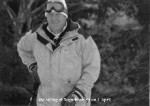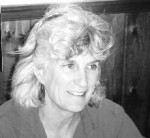Alumni Profile

Not long ago a fellow Alumni Board member suggested I write an alumni profile for the college publication. ‘Yeah, I’ll do it,’ I said, ‘but what do you want in it?'”Oh, you know, what Castleton meant to you, your career, the greater meaning of life and our position in the cosmos, that sort of thing,” I was told.
Well, I have been ruminating on the subject and how to organize my thoughts into a coherent few paragraphs.
Castleton in the 1960’s was a smaller place than it is today although I sense that the close relationship between professors and students continues. I arrived on campus in the fall of 1965 having transferred from another college. I was one of the first 10 students to move into Adams Hall 101.
I was a history major and there were several professors who left their mark on me and continue to today in a very positive way. All of them have passed away over the past 15 years, but I was fortunate to have been able to tell them of their influence before they died. Professors Bob Patterson, Warren Cook and Holman Jordan were the ones who had the greatest influence on me. A Mr. Gosselin, who taught Spanish, also had a very large influence in my life — though at the time I thought the event was the end of the world and my future plans.
I met Patterson my first day on campus when I was signing up for classes. He asked me what I wanted to major in and do with my life and I told him history and law.
He asked if I would like to go to Yale Law School, to which I replied ‘yes.’ He handed me my schedule with three history classes, Spanish, a history of art class and a geography class filled in. I was buried. He became my coach and one of my two mentors at Castleton. He taught me to be a historian and how to think.
Cook had two doctorates, one in anthropology from the Universidad de San Marcos in Lima, Peru and the second one in history from Yale. He was on his way into class one day early in my tenure at Castleton and stopped to ask why I looked so glum.
I answered that I thought that I had known some history before coming here, but that I was finding out that I didn’t know very much.
He said, “Tim, it’s not how much information you carry around in your head that is important, but that you know where to go to get the information.”
He taught me how to research. He wanted me to become a history professor.
Jordan arrived on campus when I did in 1965. He was of a different style than Patterson and Cook, but could draw good work out of you if you did the reading and thought about what you read. He ran the senior seminar for history majors and through him I learned how to write well enough to get my paper published.
There was a war on in 1966 and I was healthy and without money enough to seriously consider graduate or law school.
My Draft Board would be knocking on my door within weeks of graduation in 1967 so I joined the Marine Corps PLC program in the spring of 1966 and attended the officers’ candidate course at Quantico, Va. that summer. I successfully completed the course and returned to Castleton in September of 1966 and would be commissioned a second lieutenant upon graduation. I had to complete two years of a language to complete my graduation requirement of an intermediate level language. Gosselin was my Spanish teacher and I flunked intermediate Spanish in the first semester of my senior year. I would not graduate with the class of 1967 and would not be commissioned in May.
I would have to take an intermediate level language in the summer of 1967 to graduate and would be considered as member of the class of 1968. I thought it was the end of the world, but it probably saved my life. You see, if I had graduated in May with my class I would have reported aboard at “The Basic School” at Quantico in early June or July of that year. I would have completed the course in November or December of 1967 and would have arrived in Vietnam in early January of 1968.
I would have just arrived when the “Tet” offensive of 1968 hit. The Classes I missed, N and O Companies, suffered the highest casualty rate of second lieutenants the Marine Corps suffered since the dark days of the Korean War.
I left the Basic school in March of 1968 and arrived in Vietnam in July of 1968 and missed the meat grinder that my on-time graduation would have put me in. In 1971 I looked up Gosselin and thanked him.
I did not end up going into either law or graduate level work in history, but ended up spending my career for the most part in the insurance business working with individuals and businesses in providing life, health ,disability insurance and long term care solutions to solve estate creation and preservation problems.
I became a chartered life underwriter in 1980 and have been with the Mass Mutual Financial Group since 1982 here in Portland, Maine with one sojourn of 4-1/2 years as the chief executive officer of the Maine Veterans Homes.
So how did my Castleton experience affect me? Castleton prepped me to succeed as a Marine Corps officer, an insurance agent/advisor and the CEO of a $42 million a year long term care operation by molding the way I thought, evaluated information, researched a problem and came to a decision.
My oldest daughter Wendy graduated from Castleton with a degree in history in 1990 and was fortunate to have had Patterson, Cook and Jordan influence her academic life as well.
Patterson referred to her as his granddaughter. I do not think that there are many institutions like Castleton that provide such a close community and intellectually stimulating environment. Castleton is a special place for me and that is why I support it.






